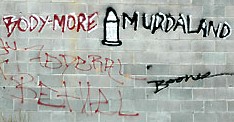 Q: What part of the production crew is the most under-appreciated or under-rated? [Jim King]
Q: What part of the production crew is the most under-appreciated or under-rated? [Jim King]A: The entire production is under-appreciated, isn't it? Have you seen any of our production components -- our cinematography, our locations work, our set design, our casting, our make-up and wardrobe, our sound work, our editing - acknowledged with any award nominations or even routine attention? I am loath to single anyone out and risk alienating the rest of the best crew in television.
But I will commend the entire production for this:
 For more than a decade, we have filmed in neighborhoods in Baltimore that most people would find inhospitable and
alienating, if not, in some ways frightening to many outsiders. We have done so without incident, without losing
equipment or having anyone hurt - and without alienating people in the neighborhoods were we have worked. We get
the work done when extraordinary, unscripted events are often taking place a block or two away, with police helicopters
flying overhead and sirens blaring to threaten our audio, with entire neighborhoods coming 'round to watch the filming and
interact with the cast ("Ho, shit. It's Omar. Hey, Omar. Come rob me, yo!"), or when our choice of
location has obliged us to displace actual drug corners.
For more than a decade, we have filmed in neighborhoods in Baltimore that most people would find inhospitable and
alienating, if not, in some ways frightening to many outsiders. We have done so without incident, without losing
equipment or having anyone hurt - and without alienating people in the neighborhoods were we have worked. We get
the work done when extraordinary, unscripted events are often taking place a block or two away, with police helicopters
flying overhead and sirens blaring to threaten our audio, with entire neighborhoods coming 'round to watch the filming and
interact with the cast ("Ho, shit. It's Omar. Hey, Omar. Come rob me, yo!"), or when our choice of
location has obliged us to displace actual drug corners.We have routinely been able to convince the law-abiding residents of many of these neighborhoods that we will respect their concerns, that we will not trash these streets, that we will leave our film sets better than we have found them. And we have been able to convince the corner boys that we are not the police, that we will film our scenes and move on without provoking any police response against them. It is a delicate process, but we make it work for us and for the communities as well, regardless of where we find ourselves in Baltimore.
Out of these neighborhoods, too, we have found and hired actors, crew members, and office staff and we have been able to channel our resources to charitable endeavors that have nothing to do with filmmaking. One of our wardrobe supervisors began his career by following the Homicide crew around the city as a kid, standing behind the video monitors and asking questions. Once an adolescent mascot, he is now a reliable member of the film team. And at all points, we have recognized that we are visitors to these places and that after our film is shot and our trucks depart, other people will continue to live and struggle there. I am very proud of how we have interacted with so many communities in Baltimore and how welcome we still are in the city - at least on the street level.
<< Back || Next>>